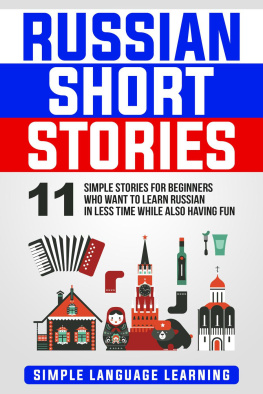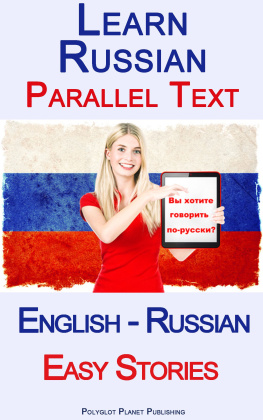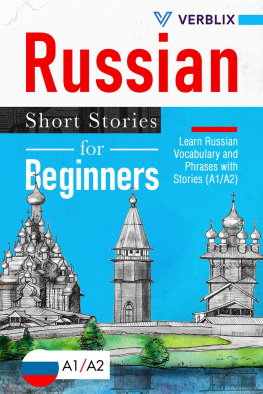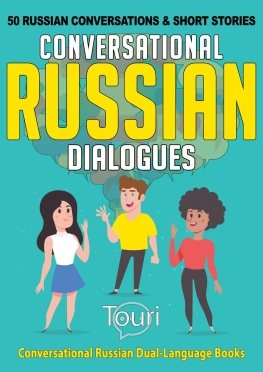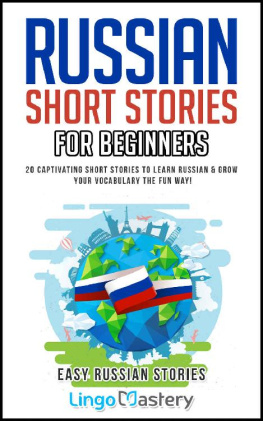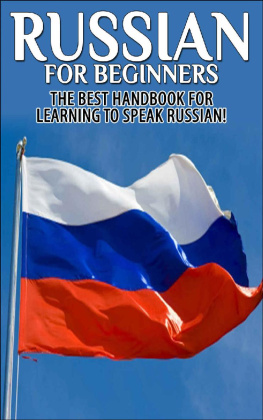Russian Short Stories
11 Simple Stories for Beginners Who Want to Learn Russian in Less Time While Also Having Fun Copyright 2019 All rights Reserved. No part of this book may be reproduced in any form without permission in writing from the author. Reviewers may quote brief passages in reviews. Disclaimer: No part of this publication may be reproduced or transmitted in any form or by any means, mechanical or electronic, including photocopying or recording, or by any information storage and retrieval system, or transmitted by email without permission in writing from the publisher. While all attempts have been made to verify the information provided in this publication, neither the author nor the publisher assumes any responsibility for errors, omissions or contrary interpretations of the subject matter herein. This book is for entertainment purposes only.
The views expressed are those of the author alone, and should not be taken as expert instruction or commands. The reader is responsible for his or her own actions. Adherence to all applicable laws and regulations, including international, federal, state and local laws governing professional licensing, business practices, advertising and all other aspects of doing business in the US, Canada, UK or any other jurisdiction is the sole responsibility of the purchaser or reader. Neither the author nor the publisher assumes any responsibility or liability whatsoever on the behalf of the purchaser or reader of these materials. Any perceived slight of any individual or organization is purely unintentional.
R eading and a Foreign Language Any person studying a foreign language usually deals with four necessary elements: Listening, Speaking, Writing, and Reading.
They are the keystones of language learning as they constitute all the necessary language skills. Yet, in addition to being a keystone, reading may also be a lot of fun. It is a very intense activitywhile reading, you can simultaneously learn grammar concepts as well as new vocabulary and idiomatic expressionsall in one pack. The best part is that sometimes you dont even have to study all of these things specificallythey often become clear from the context, and you can easily memorize them without additional efforts. Reading illustrates and provides very useful insights into the things you have studied in a grammar book. If you manage to find a really interesting and captivating text that is suitable for your level, not only will you get the grammar and vocabulary almost automatically, but you will also have a great time and learn something new about the world.
Also, reading is very a comfortable way of learning as you can do it at your own pace and return to especially tricky abstracts as many times as you need. Moreover, using modern technologies, you can also combine reading and listening aspects, complementing them both. Hints and Tips for Reading Here are some hints and tips that will help you make reading a pleasant activity. First of all, try to find a text that really interests you. Texts should correspond to your language level and be connected with a topic or a subject you really love. One of the ways to level up your reading skill is to readin the foreign language you are studyingyour favorite book, the one you have already read in your language and thus know well.
A well-known book is usually available in many languages, and you will probably find the translation in your target language. It may be your favorite childrens book for a start as the language is usually simpler, and later on, you may begin reading something more complicated. Also, with todays technologies, you can easily use the Internet to find various reading materials that catch your attention. Many articles, reviews, discussions, and descriptions are usually available for almost any topic in any language, and you can choose whatever your heart desires. While making this book, the aim was to make it a source of fun for you, not only to learn some language stuff but also to have a good time and learn some things about Russian culture and Russian people. Next, while reading a text in a foreign language, you shouldnt be intimidated by new vocabulary and grammar.
Remember: you can have it at your own pace! You dont have to look up every new word or unknown expression in the dictionary or grammar book as soon as you encounter it. Although it is highly recommendable to use a good dictionary and a grammar reference when reading, the main thing for a beginner is to get the gist. You can return to a tricky word later, or you can get its meaning from the context of the storyitll be even better as it gets stuck in your memory much more effectively this way. While reading something big, e.g., a novel, it is recommended that you look up a word if it is really essential for grasping the meaning, or otherwise, if you, say, have encountered this same word more than three times. The same principle works for grammar as wellvery often, you can get the idea from the context. In this book, the list of the key vocabulary for every text is provided, so you can use the items from the list as the stepping stones and later on study other new words in detail.
Also, you will find a very close, almost word-for-word English translation for every paragraph that will help if you have any difficulties with grasping the meaning. Hints and Tips for Reading in Russian The first good news is that the reading rules in Russian are very simplenearly all the letters are tightly connected with the sounds they represent. Of course, there are some spelling rules and exceptions, but in most cases, if you know the Russian alphabet and the basics of reading and pronunciation, you can read in Russian with ease. While reading in Russian, remember that, unlike English, Russian word order isnt fixed . Surely, there are some set sentence patterns, but usually, you can easily reorganize the words. Reorganizing may change the emphasis and some stylistic aspects in a sentence, but the basic meaning will not change.
So, do not be surprised by the word order and concentrate on the meaning no matter in what combination the words are used. While reading in Russian, you will inevitably encounter the great and terrifying Russian grammar. It is consideredand justifiably soto be quite complicated. Unlike English, which is primarily an analytic language and relies heavily on the word order and some special words, Russian is a synthetic languageit uses many inflections or word endings to express grammar and syntactic relationships. Yet, here is some more good newswhile reading, you can often get the idea without knowing all the grammatical nuances. Later on, you can return to the grammar concepts that puzzled you and study them more thoroughly.
There are a lot of confusing endingsfor various grammar cases, genders, plural and singular forms, but fortunately, you dont have to know all of them to understand a beginner text. Reading this Particular Book This book was created to be interesting as well as useful, so here youll find some texts that have a dynamic plot and provide you with some information about Russian culture and customs. The texts contain some simple grammar. The grammar isnt the main focus here, but you will learn many helpful grammar aspects in the contextwhile reading. Also, every text emphasizes some particular grammar issue, e.g., a grammar case, a verb aspect, etc.and you will see a very brief grammar note under every text explaining it. So, use the grammar notes as a guide to the grammatical element.

